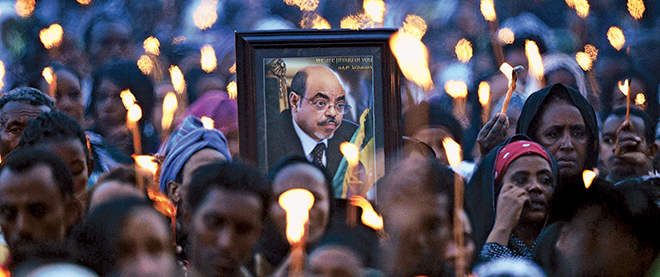Ethiopia says farewell to a ruthless hero
The nation mourns the death of a complicated, controversial—and beloved—leader
Carl De Souza/AFP/Getty Images
Share

In Addis Ababa last week, it was impossible to miss Meles Zenawi’s grip on the popular imagination. On Aug. 20, the government announced that Ethiopia’s first and only prime minister had died in Brussels of an unknown illness, after 21 years in power—and weeks of speculation following his disappearance from public view. Zenawi’s image soon appeared in the signage over fruit markets and banks, on hats, in the windows of cars and buses, even in the playing cards children sell for change in the streets. One restaurant had an unusual memorial: Zenawi’s face painted in cocoa powder and butter on an Ethiopia-shaped pizza. At night, the city’s bars and clubs were silent, and no one danced because a state of national mourning had been declared. Instead, TVs broadcasted tributes to his excellency on loop, with news that the former deputy, Hailemariam Desalegn, would take power until elections in 2015.
“Addis is very sad right now,” a taxi driver says en route to the national palace, where the late PM lay in state in advance of Sunday’s funeral. Asked why people love Meles, as he is known, he gestured with his hands: “Jobs. He bring us work,” he said. Women like him too, he said; Meles advocated for equal rights. Others expressed their adoration: because he was brilliant and had a strong vision for the country; because he liberated them from a military dictatorship, brought back Ethiopian pride and increased investment in education and health care. (His health minister is lauded around the world for enacting progressive, evidence-based policies.) Zenawi was also a key mediator between Sudan and South Sudan, and an ally in the U.S.’s war on terrorism in the Horn of Africa.
But human-rights observers say the advancements came at a cost: jailed journalists, political prisoners, contested election results and a concentration of power that only expanded during his tenure. He was known to hold meetings without any aides present; his was the final word. Ethiopian journalists told me there’s little hope for a free press and for voicing dissenting opinions, so the people don’t have enough information to even begin to critique Zenawi’s administration.
Indeed, behind the mass mourning, there are questions. As a father of two put it, while Zenawi is credited with guiding the economy through annual double-digit growth rates in the past decade, “I personally just don’t see it. I have a job, but things cost more money.” Ethiopia is still a place where people die of hunger, and the per capita income is about $3 per day. On a drive through the capital, a local physician pointed out, “See all the young people on the road? That’s because people die early here.” Nearly half the population is aged 14 or younger.
Outside the palace, which looks like an African Versailles, with high iron-and-brick gates and long driveways, the throngs arrived to mourn Zenawi. Most were wearing their Sunday best, and women’s heads were covered for modesty.
Inside, past the security checkpoint, the crowd was shepherded into a spare, cold marble hall with high ceilings and drawn curtains. Tributes played on TV screens as mourners sat solemn-faced, waiting to pay respect. Then we were herded out again, deeper into the compound along a verdant flower- and tree-lined path. As we approached the top of the winding road, the line narrowed to a single file, and suddenly we were in front of the coffin, draped in a red, green and gold flag, at the top of red-carpeted stairs.
The casket was closed: no embalmed body, and questions about the circumstances of Zenawi’s death remained unanswered. Around the coffin were photos of Zenawi and bouquets of flowers. Women were keening in an Ethiopian mourning ritual. There must have been 10,000 visitors waiting their turn, and in the coming days there would be many more, including various heads of state, such as South African President Jacob Zuma and Nigeria’s Goodluck Jonathan.
Back outside the gates, amid black fumes from passing cars, young men sold T-shirts with images of his excellency. The taxi driver bought one, and when he stopped at a roadside market, he got out to immediately put it on. While the world grapples with the legacy of a polarizing figure and ponders the big question—what’s next for the country?—this Ethiopian wanted to show his people he is filled with sorrow.